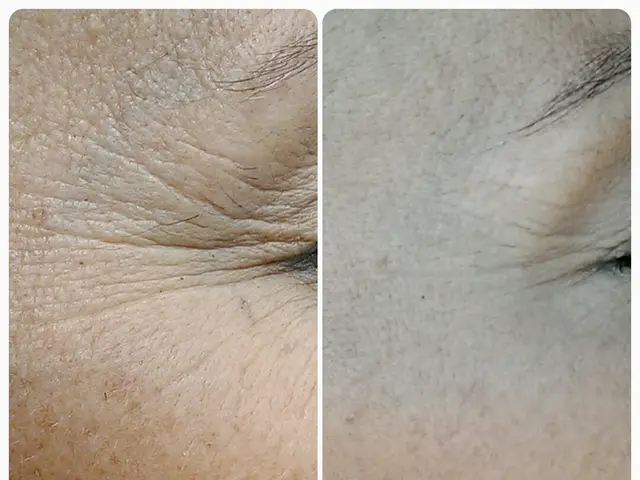Rapid and severe rosacea: Uncovering origins, signs, and remedies
Rosacea Fulminans: A Rare and Severe Skin Condition
Rosacea Fulminans is a rare and severe inflammatory skin disorder that manifests suddenly, primarily affecting the central portion of the face, including the forehead, cheeks, nose, and chin. This condition is better known as Pyoderma Faciale, and it presents with swollen, painful, and inflamed nodules and pimples that can fuse together, differing from the symptoms of rosacea or acne.
Usually occurring in females of childbearing age, the exact cause of Rosacea Fulminans remains elusive. Some evidence suggests possible connections to inflammatory bowel disease, pregnancy, and prior rosacea. Emotional stress, hormonal fluctuations, and certain medications are potential triggers of this condition.
Research in 2021 has shown that dietary factors might exacerbate rosacea symptoms, but it is not specific to Rosacea Fulminans. Spicy foods, alcohol, foods containing cinnamaldehyde, such as chocolate, tomatoes, and citrus fruits, histamine-rich foods and beverages, and hot drinks are potential dietary triggers. It is crucial to note that triggers can vary significantly from person to person, so healthcare professionals do not recommend specific dietary adjustments for all people with rosacea.
Symptoms of Rosacea Fulminans include sudden onset of localized skin color changes, such as redness, painful pustules and papules, inflammation, flushing, and stinging or burning. In some cases, ocular symptoms like dry, burning, or itching eyes and light sensitivity may occur. Systemic symptoms, such as fever and fatigue, are rare.
Treatment options for Rosacea Fulminans may involve oral isotretinoin, a prescription acne medication, and corticosteroids, administered orally or topically. In a 2016 case study, antibiotics combined with corticosteroids and lifestyle changes proved helpful in resolving symptoms. As certain factors might trigger or worsen rosacea, healthcare professionals may advise identifying and avoiding these triggers, such as reducing stress and making specific dietary changes like limiting alcohol.
A dermatologist or another healthcare professional can provide personalized care and comprehensive management strategies for those experiencing symptoms of Rosacea Fulminans. Early diagnosis and treatment are vital for managing symptoms effectively and preventing complications such as scarring and infections, possibly relieving emotional distress and improving overall quality of life.
Contacting a healthcare professional is crucial when experiencing any symptoms beyond typical rosacea or acne, such as large, tender nodules, abscesses, significant facial discomfort, sudden onset, persistence or worsening, eye irritation or inflammation, or systemic symptoms like fever. Seeking prompt diagnosis and treatment will help with faster resolution of symptoms and minimize complications.
- Rosacea Fulminans, a rare chronic disease, primarily affects the skin, specifically the central portion of the face, and is categorized as a severe inflammatory skin condition.
- The mysterious nature of Rosacea Fulminans suggests potential connections to medical conditions like inflammatory bowel disease, pregnancy, and pre-existing rosacea, while emotional stress, hormonal fluctuations, and certain medications are potential triggers.
- Research in the field of dermatology reveals that rosacea symptoms might be influenced by dietary factors, but this is not specific to Rosacea Fulminans; potential dietary triggers include spicy foods, alcohol, foods containing cinnamaldehyde, histamine-rich foods, and hot drinks.
- To manage symptoms of Rosacea Fulminans effectively, treatment options can involve prescription medications like oral isotretinoin and corticosteroids, administered either orally or topically. In addition, healthcare professionals may advise identifying and eliminating triggers, such as reducing stress and making specific dietary adjustments like limiting alcohol, for overall health and wellness.








